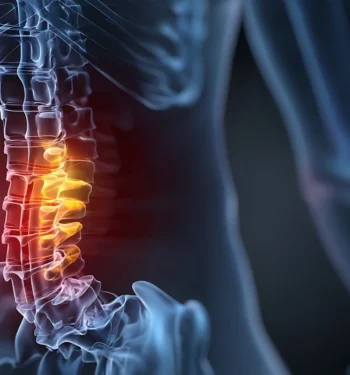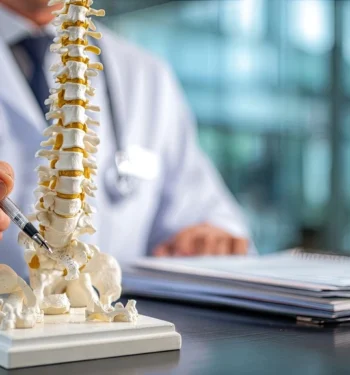
Introduction: Understanding Spinal Stenosis and Its Prognosis
Spinal stenosis is a degenerative disease that occurs when the spaces within your spine narrow, putting pressure on the spinal cord and nerve roots. This common spinal condition affects millions of people, particularly those over 50. Understanding your spinal stenosis symptoms and prognosis is crucial for making informed decisions about treatment and planning for your future quality of life.
If you’re seeking spinal stenosis treatment in Indiana, expert evaluation from specialists like those at Goodman Campbell can deliver personalized insights into your specific case, providing comprehensive care that addresses both immediate symptoms and long-term management strategies.
How Long Can a Person Live With Spinal Stenosis?
The life expectancy for individuals with spinal stenosis is generally not significantly different from the general population. Spinal stenosis itself is typically not a life-threatening condition, and spinal stenosis death rates are extremely low. Most people with this chronic pain condition can expect to live normal lifespans with proper management.
Can spinal stenosis kill you? In rare cases, severe complications such as cauda equina syndrome or severe myelopathy can lead to serious health issues if left untreated. However, these complications are uncommon and can be prevented with appropriate medical care. The spinal stenosis prognosis for most patients focuses on managing symptoms and maintaining quality of life rather than survival concerns.
Is Spinal Stenosis a Serious Condition?
Spinal stenosis severity varies significantly among individuals. For some, it causes only mild spinal stenosis discomfort and minimal impact on daily activities. Others experience severe neurological deficits that substantially affect their quality of life.
What are the worst symptoms of spinal stenosis?
The worst symptoms of spinal stenosis can include:
- Severe leg pain and weakness
- Loss of bowel and bladder control
- Significant walking limitations
- Numbness in the legs and feet
- Progressive muscle weakness
Is spinal stenosis a permanent disability? While some people do experience permanent disability from advanced cases, many patients maintain active lifestyles with proper treatment. The spinal stenosis prognosis depends largely on early intervention and appropriate management. Consulting with specialists like Goodman Campbell early can help prevent progression to more severe spinal stenosis stages.
What Are the Stages of Spinal Stenosis and What Is the Final Stage?
What are the four stages of spinal stenosis?
The four stages of spinal stenosis represent the progressive nature of this condition:
Stage 1: Mild narrowing with minimal symptoms
Stage 2: Moderate spinal stenosis with intermittent pain
Stage 3: Severe narrowing with consistent symptoms
Stage 4: Critical narrowing with neurological complications
What is the final stage of spinal stenosis?
The final stages of spinal stenosis can involve serious complications and often include significant nerve compression that can result in permanent neurological deficits, including paralysis, incontinence, and loss of sensation. However, reaching this stage is preventable with appropriate medical intervention.
In advanced cases, cervical spinal stenosis can lead to myelopathy in the cervical spine, which causes problems with coordination, balance, and fine motor skills. In the lumbar spine, another condition that has the potential to result is cauda equina syndrome, a surgical emergency that can cause permanent nerve damage if not treated immediately. Addressing inflammation through nonsteroidal anti-inflammatory drugs may also be part of a conservative care plan.
How Do You Stop Spinal Stenosis From Progressing?
Prevention of progression of spinal stenosis involves a multifaceted approach:
Lifestyle changes:
Recommended lifestyle modifications may include maintaining a healthy weight, staying physically active with low-impact exercises, and practicing good posture. Physical therapy can also strengthen supporting muscles and improve flexibility.
What is the best pain management approach for spinal stenosis?
Interventional pain management typically starts with over-the-counter options. In more advanced cases, doctors may prescribe medications, depending on individual symptoms and response to treatment.
What is the newest treatment for spinal stenosis?
The newest treatment for spinal stenosis isn’t always the right choice for every patient. Goodman Campbell provides a range of minimally invasive procedures, such as MILD (Minimally Invasive Lumbar Spine Surgery Decompression), to relieve pressure on spinal nerves with less disruption to surrounding tissue. Minimally invasive techniques like this one are associated with shorter recovery times and fewer risks. If surgery for spinal stenosis is required, some patients may be candidates for spinal fusion surgery to stabilize the spinal column.
Regular follow-ups with spine specialists are essential for monitoring progression and adjusting treatment plans. Request an appointment or ask your doctor about Goodman Campbell’s expertise in advanced spinal stenosis treatments and their team’s comprehensive approach to patient care.
Navigating Your Prognosis and Next Steps
Your spinal stenosis prognosis depends on multiple factors, including the severity of your condition, your overall health, and how quickly you seek treatment. While spinal stenosis is a progressive condition, many patients successfully manage their symptoms and maintain active lifestyles with appropriate care.
The key to a positive outcome lies in developing an individualized treatment plan with experienced spine specialists. Early intervention can prevent progression to more severe stages and preserve your quality of life. In many cases, magnetic resonance imaging is used to evaluate the spinal anatomy and guide the decision between nonsurgical treatment options and potential surgical intervention.
Spinal stenosis doesn’t have to control your future. Schedule a spine specialist consultation with Goodman Campbell to explore your treatment options and develop a comprehensive management strategy. Ask your doctor about Goodman Campbell’s advanced treatment approaches and how they can help you achieve the best possible prognosis for your specific situation.



